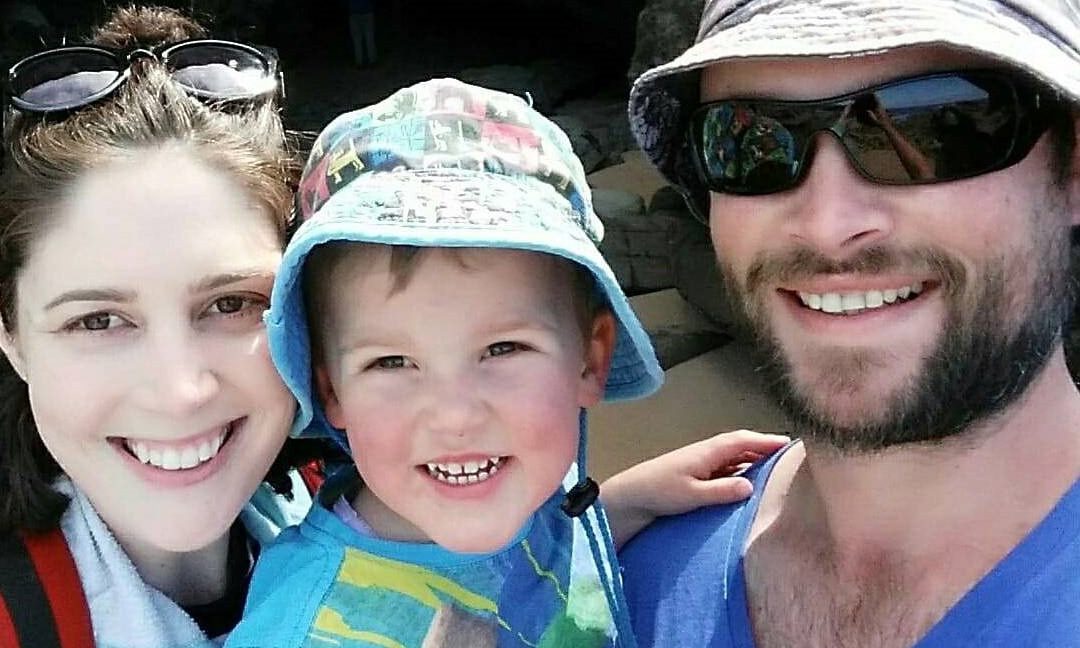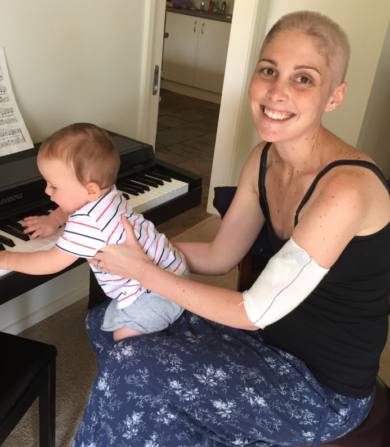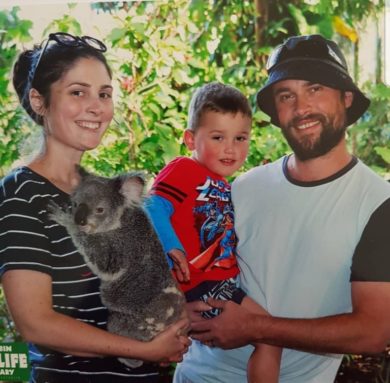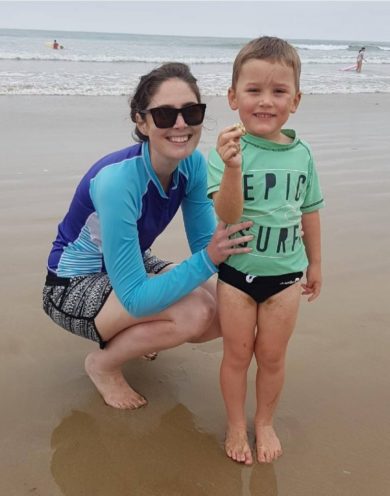Lisa’s early pregnancy symptoms turned out to be AML

One of the hardest things Lisa Christie has done is to stop breastfeeding her eight-month son, Jackson, after being diagnosed with AML in late-2015 so she could start treatment immediately.
Three months later, on Jackson’s first birthday, she had a life-saving stem cell transplant, and now she’s back at work as a registered nurse and life is “pretty much back to normal”.
Four years ago, Lisa was on maternity leave, when she and husband, Anthony, were shocked to find out she was pregnant again.
“In retrospect, the symptoms I thought were from pregnancy – night sweats, bleeding gums, weight loss and fatigue – were all signs of leukaemia,” said Lisa, 33, of Melbourne.
“We were excited about the prospect of another baby and I went to the GP to get regular pregnancy bloods done.”
The lead-up to Lisa’s AML diagnosis
It was December, “a hectic time for everyone, and I was busy Christmas shopping”, said Lisa. And as fate would have it, Lisa’s mobile had stopped working just as her doctor’s reception was trying to get hold of her.
“In the end, my GP resorted to calling my husband, to drag me in to get my blood results.
“I saw a lovely doctor who I hadn’t met before. My neutrophils were 0.1, which I knew was pretty bad. He didn’t want to panic me but instructed me to go straight to hospital.”
To make matters worse, Lisa, who was about seven weeks pregnant, was miscarrying.
She spent the night of December 17 in an isolation room at the hospital, which she also knew “was bad”, and the next day was transferred to the haematology ward of another hospital, for “the first of many bone marrow biopsies”.
“I had 45% blasts in my bone marrow,” said Lisa, and hours later, a scan showed her pregnancy wasn’t viable “thank goodness”.
“Needless to say, that was a horrible 24 hours! Anthony and I were shocked and very emotional,” she said.
“I still remember sitting in the family room, talking to the nurse unit manager of the haematology ward. It was so strange… because I work at the same hospital and was friends with nurses who were seeing me at my most vulnerable.”
On December 19, Lisa had a D&C* in the morning and a PICC line inserted that afternoon.
“My family came over from Shepparton that day. My parents and sisters were obviously devastated. They tried to hold it together around me, but I have never seen my dad cry that much.
“I think that was the hardest, seeing my two sisters and my parents,” said Lisa.
“Anthony and Jackson were there constantly. I was breastfeeding still up until the admission.”
Starting treatment
The next day she got the diagnosis of AML with trisomy 6 – a rare chromosomal abnormality, and two days later, she had her first round of chemotherapy (HIDAC3).
“Jackson’s first Christmas and my 30th birthday were a blur of sleeping, blood and platelet transfusions and diarrhoea!” said Lisa.
In early-January, she was told she needed a stem cell transplant (SCT).
“I wasn’t happy about this. At the time, I was really scared, but later I realised it was the best treatment for me and I needed to trust the experts.
“I looked up the protocol on the hospital portal, which I shouldn’t have… the doctors told me off for doing that,” said Lisa with a laugh.
“I soon realised all the data was based on older people, not someone in their 30s.
“My sisters were tested to see if they could donate their stem cells to me, but unfortunately they weren’t a match. So began the search for an unrelated matched donor, and I stayed in isolation for a month!”
At the end of January, Lisa was admitted for the first cycle of consolidation chemo – little-ICE, and after a week she was discharged.
“The doctors thought my bone marrow was starting to recover but unfortunately this wasn’t the case.”
A routine bone marrow biopsy showed Lisa’s neutrophils, haemoglobin and platelets were dangerously low.
“I was readmitted, which I was devastated about. I just wanted to spend more time with Jackson.
“They [Lisa’s medical team] realised then that they needed to find a donor quickly. My marrow was struggling. I was given two units of blood as my Hb was 77, and the following day it had decreased to 75.”

Lisa’s stem cell transplant
On March 8, Lisa has a Hickman line inserted in preparation for her SCT, she had G-CSF** to keep all her counts up and went home.
“More importantly, they found an unrelated male donor in Melbourne!” said Lisa, who was admitted on March 13 to begin her pre-SCT chemo and to top up her platelets and haemoglobin.
“The 21st of March was a huge day for us. Jackson’s 1st birthday and my stem cell transplant day!”
Lisa is “going really well” now.
“I am three years post-transplant and feeling great,” she said.
“I was lucky enough to not suffer any graft versus host disease and I see my haematologist every six months.”

Returning to work
“I have returned to work three days a week, while still looking after Jackson.
“Mentally I was terrified of returning to work, and I think having all my treatment at the same hospital where I work didn’t help. But I’ve been back for more than two years and have well and truly settled in.
“I’m not as physically fit as I was before my diagnosis and I get tired easily, but I try to push through.
“I definitely don’t go out and drink as much as I used to, but that may have something to do with being a mum!
“I find I’m more paranoid then I used to be. If I lose weight, I automatically think the worst. If I get a temperature, I automatically think the worst, but I am getting better at rationalising things now.
“Emotionally, physically, mentally and spiritually, becoming infertile after treatment has affected me the most,” said Lisa.
“And practically, it was so hard to be apart from Jackson,” said Lisa about her diagnosis and suddenly having to give up breastfeeding.
“I think it was tougher on my husband, who had to look after Jackson full time… with the help of his parents and my parents.
“I didn’t seek support, my family and friends just offered it,” said Lisa, who didn’t access any of the Leukaemia Foundation’s support services.
“Fortunately, we have not needed to.
“My friends tried to visit whenever I would let them. My parents and sisters travelled over an hour to visit every week. On my breaks from hospital, Jackson and I would stay with my parents in the country, and my in-laws were amazing, helping wherever they could.
“When I was improving and needing to attend hospital appointments, my friends babysat Jackson for me while Anthony was working.”
“Tough love” and other practical advice
Talking about other ways people have helped, Lisa said she received some “tough love” from a nurse when she was having a down day.
“She said, ‘the patients that get up and move always do better than the ones that stay in bed all day’, and this stuck with me the whole time I was sick. There wasn’t one day I didn’t have a shower or walk around the ward.
“I remember when I was scared to go back to work, my work friends said, ‘it will be hard the first week, and then you will be old news’ because at the time, I was worried about how people would react to seeing me back at work. I now know I had nothing to worry about.
“Do NOT say, ‘when are you having another baby?’ to anyone, let alone someone who has had chemotherapy, and ‘you’ve lost weight’ is not a good thing to say to someone who has had cancer!
What has helped Lisa
Lisa’s advice is, “stay positive” and “read other people’s inspirational blogs”.
“There are so many positive cancer stories on Instagram
and the internet,” she said.
“I found reading other patients’ blogs really helpful. I draw inspiration from other people’s life stories.
“Everyone has their struggles. I think people like Turia Pitt [severe burns survivor] and Brittany Crosby [diagnosed with Stage III ovarian cancer] are amazing.
“To go through obstacles in life and come out stronger women is something to aim for.
“During treatment my husband and family made me get up and walk every day. They held my hand when I was upset and let me rest when I needed to. I honestly couldn’t have done it without them.

Lisa’s aspirations
“I hope to be a great mum to Jackson and see him grow into a gorgeous, caring and strong man.
“I hope to increase my hours in my nursing job and continue to help each and every one of my patients.”
And right now, Lisa is looking forward to “ just living life and spending time with my gorgeous family”.
“We can’t have any more children naturally, due to premature ovarian failure,” said Lisa.
“My sister has donated eggs to us. Unfortunately, the first IVF transfer this year [2019] ended in miscarriage, but we are hoping the next embryo transfer will be our baby.
“We are very grateful for my health, and that we had Jackson before I was sick.”
In early-2019, Lisa Christie recorded her experience of having a stem cell (SCT) transplant for a friend who had a close family member who was going to have a SCT. She has shared those details here.
* Dilatation and curettage.
** Granulocyte-colony stimulating factor – a glycoprotein that stimulates the bone marrow to produce granulocytes and stem cells and release them into the bloodstream.
Last updated on August 6th, 2020
Developed by the Leukaemia Foundation in consultation with people living with a blood cancer, Leukaemia Foundation support staff, haematology nursing staff and/or Australian clinical haematologists. This content is provided for information purposes only and we urge you to always seek advice from a registered health care professional for diagnosis, treatment and answers to your medical questions, including the suitability of a particular therapy, service, product or treatment in your circumstances. The Leukaemia Foundation shall not bear any liability for any person relying on the materials contained on this website.